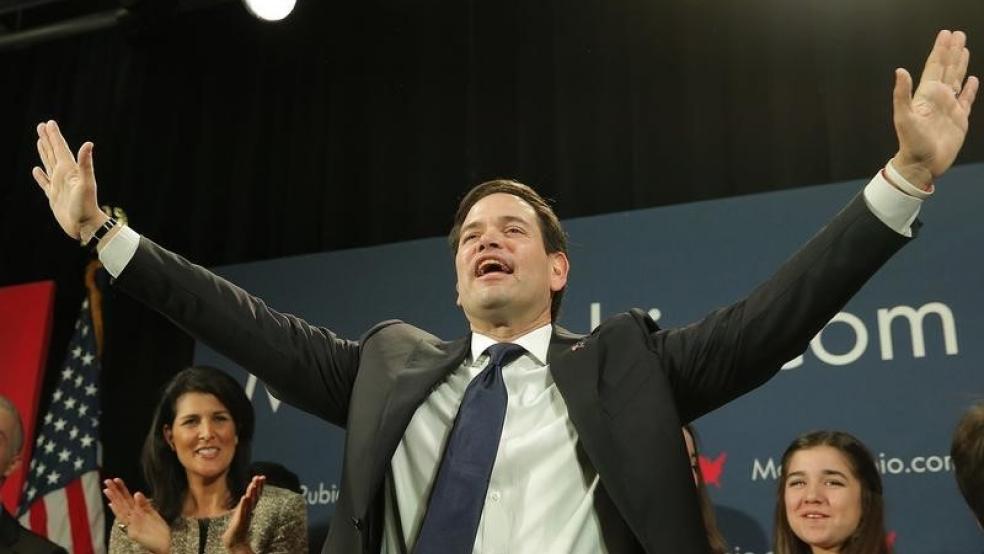WASHINGTON (Reuters) - Marco Rubio emerged from a razor-thin second-place finish in South Carolina's presidential primary on Sunday with the Republican field narrowed and his target clear: Donald Trump.
Rubio squeaked by rival and U.S. Senate colleague Ted Cruz in a vote on Saturday that cemented the appeal of firebrand outsider Trump as well as the failure of a candidate from one of America's political dynasties: Jeb Bush.The five remaining Republican candidates are now scrambling for voters in 12 states that hold nominating contests on March 1, also known as Super Tuesday, the next milestone on the road to the Nov. 8 presidential election. Rubio, a first-term senator from Florida who himself has come under attack for lacking governing experience, turned that criticism on Trump, a billionaire businessman and former reality TV star who has never held elective office.Trump is long on rhetoric but short on specifics, Rubio said on CBS's "Face the Nation," challenging the front-runner, who finished 10 points ahead in South Carolina, to provide them."If you're running to be president of the United States, you can't just tell people you're going to make America great again - I think you need to begin to explain exactly how you're going to do it, policy-wise," Rubio said, referring to the Trump campaign slogan "Make America Great Again!" Rubio criticized Trump on healthcare policy and said he found his view of Russian leader Vladimir Putin troubling."I don't think he fundamentally understands exactly who Vladimir Putin is and or exactly what he's trying to do," Rubio said, quickly adding, "This is not an attack or anything of that nature."In several television appearances, Rubio stressed his intention was not to "go after" Trump but to discuss issues.Rubio has reason to be skittish. A hallmark of Trump's campaign has been consistent and highly personal savaging of his political rivals - or anyone else he perceives has attacked him, including a milder rebuke of Pope Francis. His most notable target was Bush, whom he began characterizing early on as a "low-energy" loser.In television appearances on Sunday, Trump appeared uncharacteristically modest and took pains to lower expectations that his path to the Republican nomination was now clear.He responded to Rubio's criticism without attacking Rubio himself, saying on CBS that he had "great knowledge" of foreign policy.Cruz, who had expected his appeal to conservative and evangelical voters to give him an edge in South Carolina, said he was the only candidate who has beaten and could beat Trump.'A REAL CONSERVATIVE'Cruz told NBC's "Meet the Press" he expects conservatives to rally behind him in his home state of Texas and other contests on Super Tuesday, which include Virginia, Tennessee, Alabama, Georgia, Arkansas and Oklahoma. The next Republican contest is on Tuesday in Nevada, where Trump is the runaway favorite.Cruz said Trump has embraced liberal ideas, including abortion rights and requiring healthcare coverage, as well as liberal politicians, including Democratic presidential front-runner Hillary Clinton."Republicans want a real conservative," Cruz said on ABC's "This Week." Cruz and Rubio tried to draw voters away from Trump, a political outsider who has bucked the Republican Party establishment and caught its leaders off guard.Republican National Committee Chairman Reince Priebus struggled to explain Trump's appeal when asked on ABC's "This Week," if the South Carolina result was a rebuke to the party."No, I don't think so," Preibus replied, saying he believed voters are sick and tired of politics in general. "But who the nominee is going to be is not my choice and - and obviously, uh, we're going to support whoever that is."Trump on Sunday looked to just that possibility. He said he believed Clinton, who is competing with Senator Bernie Sanders of Vermont, would be the eventual Democratic nominee and said he was the only Republican who could win states like New York and Michigan, which lean Democratic."I will win states that aren't in play. I will win states that the Republicans don't even think of," he said on CNN's "State of the Union."Those sweeping predictions aside, Trump tried to contain expectations in several television appearances. He called both Rubio and Cruz talented men who could conceivably beat him for the nomination, along with the remaining Republican candidates: Ohio Governor John Kasich and retired neurosurgeon Ben Carson.He then quipped, "You know, crazy things happen in the world of politics." (Reporting by Doina Chiacu; Additional reporting by Megan Cassella; Editing by Jonathan Oatis)Rubio sharpens attacks after latest Trump win in White House race

© CHRIS KEANE / Reuters



